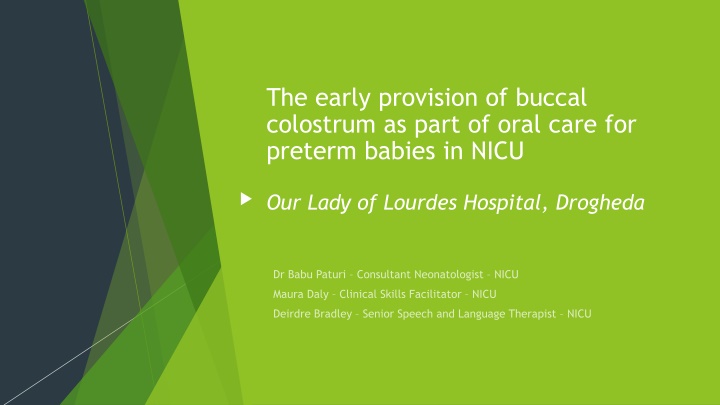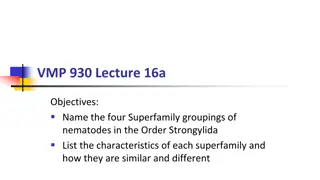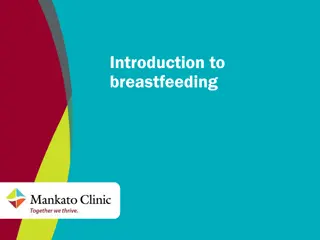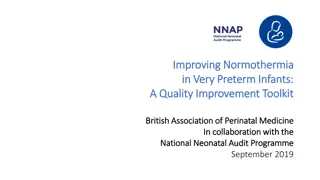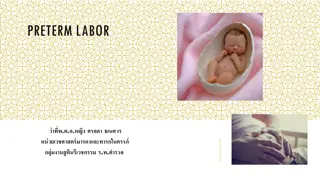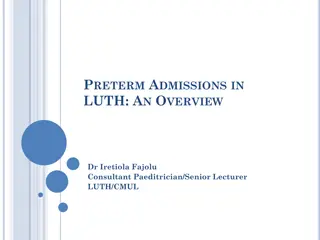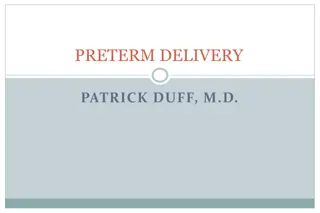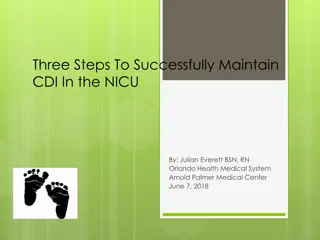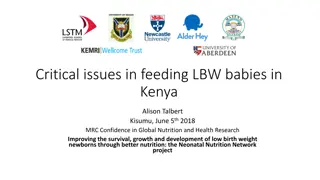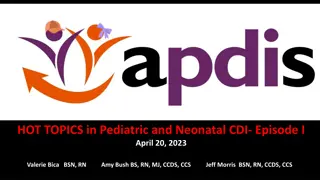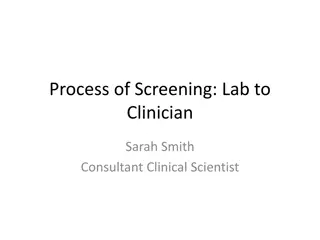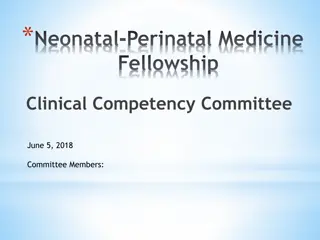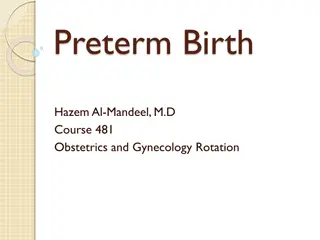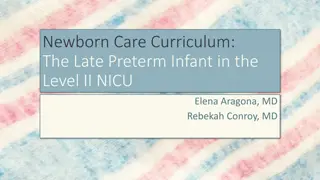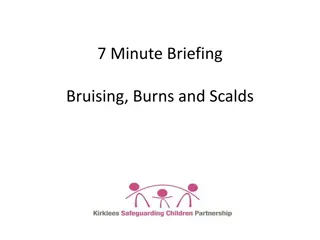Improving Buccal Colostrum Provision for Preterm Babies in NICU
Early administration of buccal colostrum to preterm babies in the NICU has shown positive outcomes such as improved gut development, reduced infection rates, and enhanced breastfeeding rates. A Quality Improvement program at Our Lady of Lourdes Hospital aimed to provide buccal colostrum within 6 hours of birth for babies under 34 weeks gestation. Results showed increased colostrum provision, reduced length of stay, and improved discharge on breast milk, leading to cost savings and positive feedback from parents and staff.
Download Presentation

Please find below an Image/Link to download the presentation.
The content on the website is provided AS IS for your information and personal use only. It may not be sold, licensed, or shared on other websites without obtaining consent from the author.If you encounter any issues during the download, it is possible that the publisher has removed the file from their server.
You are allowed to download the files provided on this website for personal or commercial use, subject to the condition that they are used lawfully. All files are the property of their respective owners.
The content on the website is provided AS IS for your information and personal use only. It may not be sold, licensed, or shared on other websites without obtaining consent from the author.
E N D
Presentation Transcript
The early provision of buccal colostrum as part of oral care for preterm babies in NICU Our Lady of Lourdes Hospital, Drogheda
Background Early administration within hours of birth of buccal colostrum (i.e. breastmilk in the cheek), can provide: positive oral experiences, improves health outcomes, improves gut development, reduces rates of infection and improves sensory taste/smell development. It can also improve breastfeeding rates for this vulnerable cohort of patients. (Synder et al, 2017; NHS Thames Valley, 2019). Maternal human milk (MBM) is the preferred substrate for all infants including preterm and sick new-borns with rare exceptions. (AAP, 2012) 0% of babies from a 2018 internal sample received buccal colostrum within 6 hours of life Aim To achieve early provision (within 6 hours) of buccal colostrum for all babies under 34 weeks gestation as part of oral cares in NICU in OLOLH Drogheda by 30 June 2021 Change Initiative A Quality Improvement programme that will improve outcomes for the patient, for the team and for the hospital
PDSA Cycles PDSA1: To assess after first 10 babies if the framework checklist was completed within the timeframe PDSA2: Assess for next 10 babies if leaflet has been given and parental education completed via NICU staff PDSA3: For next 10 babies, measure at how many hours of life is buccal colostrum received in NICU Results 11% of babies born <34 weeks received buccal colostrum within 6 hours, with a further 25% within 24 hours Reduction in the Day of Life (DOL) of first tastes from DOL18 pre-project to DOL 4 post-project Reduction in DOL achieving full oral feeds DOL 33 to DOL 24 Rise in number of babies discharged on breast milk from 44% to 60% Positive parental and staff feedback Key outcomes Reduced length of stay of 7 nights pre to post initiative = cost-saving of 204,876 across the 36 babies included (based on NICU cost estimate of 813 per night per baby (Walsh and Greene, ESSD 2018)) What worked well
Day of Life at discharge Gestation at discharge Day of Life at first full teat feed Gestation at first full teat feed Day of Life at first teat trial Gestation at first teat trial 0.00 5.00 10.00 15.00 20.00 25.00 30.00 35.00 40.00 45.00 50.00 WITHOUT ORAL CARE WITH ORAL CARE
Sustained how was the improvement sustained Long-term hospital-wide change and changes in NICU Parents driving the change as a key stakeholder Including other wards within the hospital outside the microsystem Value to Patients Short and long-term gains Gut development, boosting immune system Barrier to infection, assist with breastfeeding Spread Every opportunity must be taken to get colostrum Additional information Greene Z, O'Donnell CPF, Walshe M. Oral stimulation for promoting oral feeding in preterm infants. Cochrane Database of Systematic Reviews 2016, Issue 9. Art. No.: CD009720. DOI: 10.1002/14651858.CD009720.pub2. Accessed 17 August 2021. British Association of Perinatal Medicine, Optimising Early Maternal Breast Milk for Preterm Infants: A Quality Improvement Toolkit; 2020. Accessed 11 August 2021. Greene, Z. and Walshe, M. (2018). Saving bed days in neonatal intensive care (NICU) by supporting feeding progression and discharge: cost savings calculations. Trinity College, Dublin
